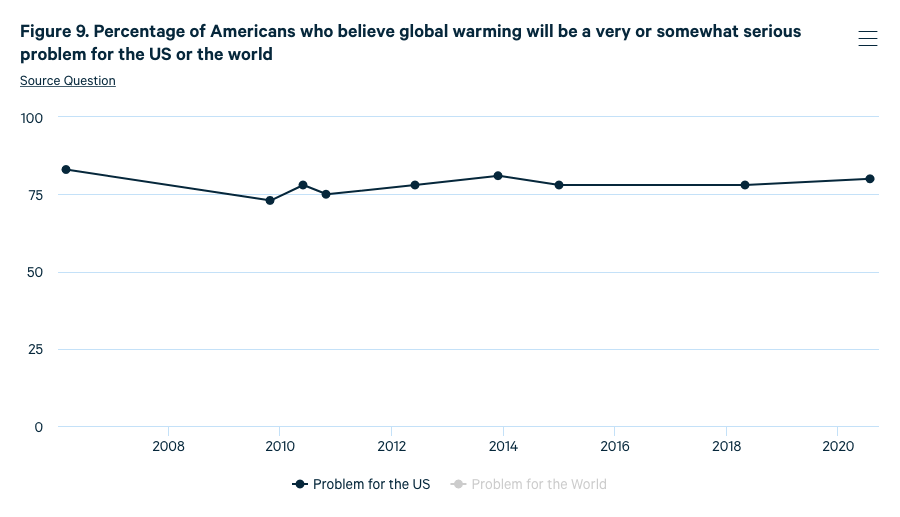
New UN report claims climate-related disasters have doubled
The report is incompetent and wrong on pretty much all accounts
The report should be withdrawn
Thread
Report here: undrr.org/news/drrday-re…
Data here: public.emdat.be
The report is incompetent and wrong on pretty much all accounts
The report should be withdrawn
Thread
Report here: undrr.org/news/drrday-re…
Data here: public.emdat.be
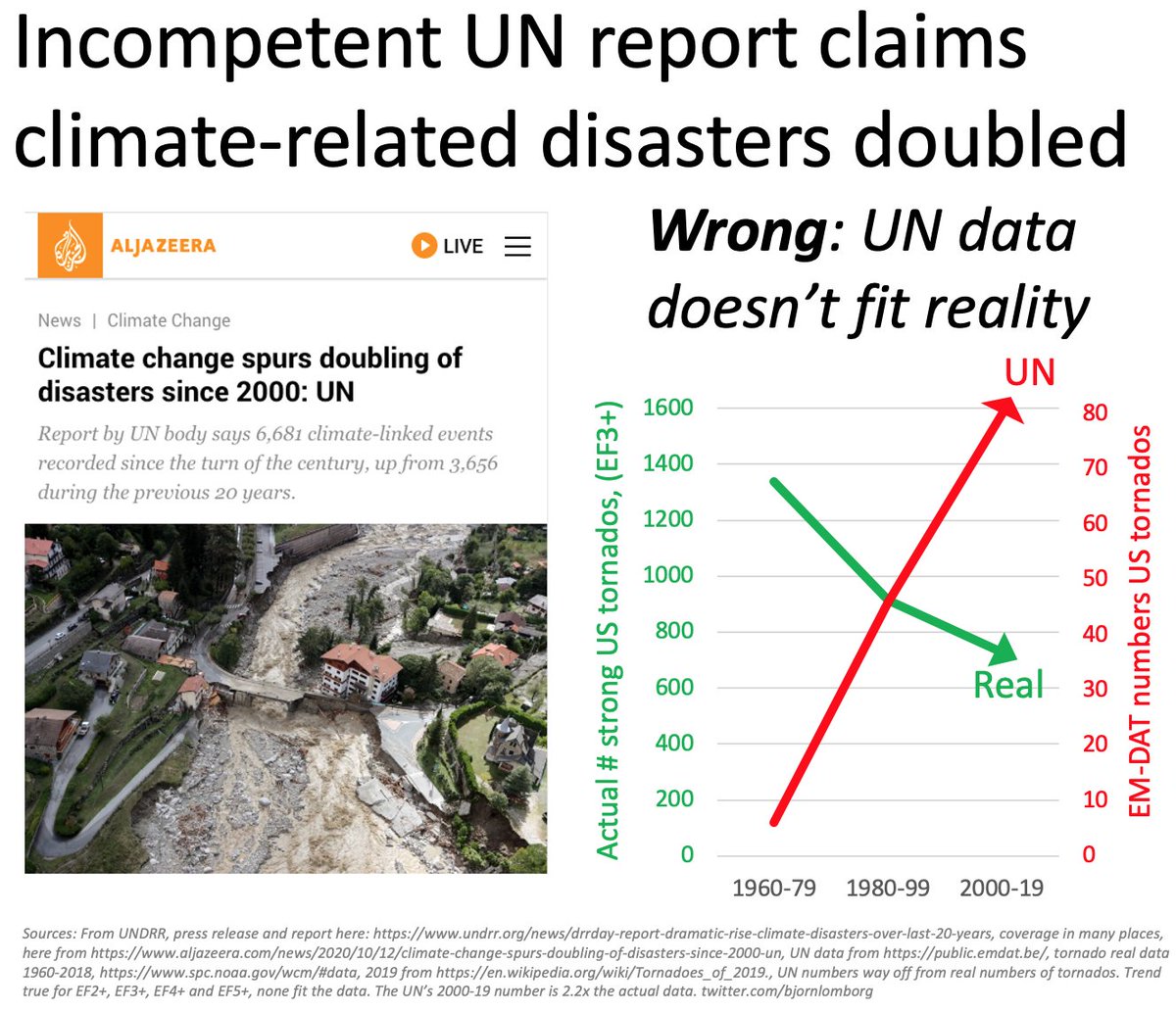
New UN report claims climate-related disasters doubled
Yet, even the report's own data shows the number of climate-related dead has *halved*
Report here: undrr.org/news/drrday-re…
Data here: public.emdat.be
Yet, even the report's own data shows the number of climate-related dead has *halved*
Report here: undrr.org/news/drrday-re…
Data here: public.emdat.be
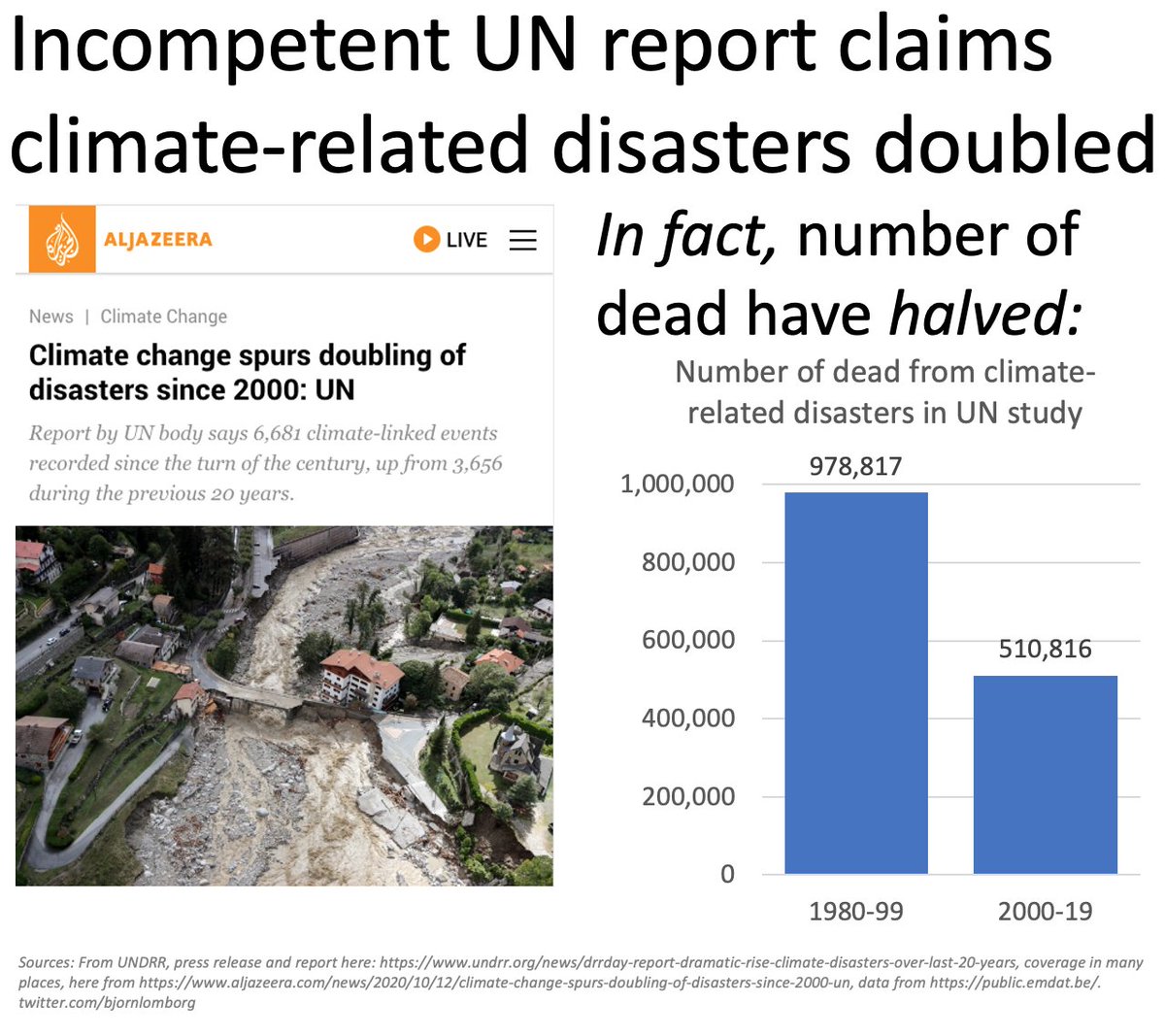
Death data is relatively robust
Instead, almost all non-death data is much better reported towards the present. That is the main reason the UN finds an increase in numbers.
Yet, they simply wave it away
Report here: undrr.org/news/drrday-re…
Instead, almost all non-death data is much better reported towards the present. That is the main reason the UN finds an increase in numbers.
Yet, they simply wave it away
Report here: undrr.org/news/drrday-re…
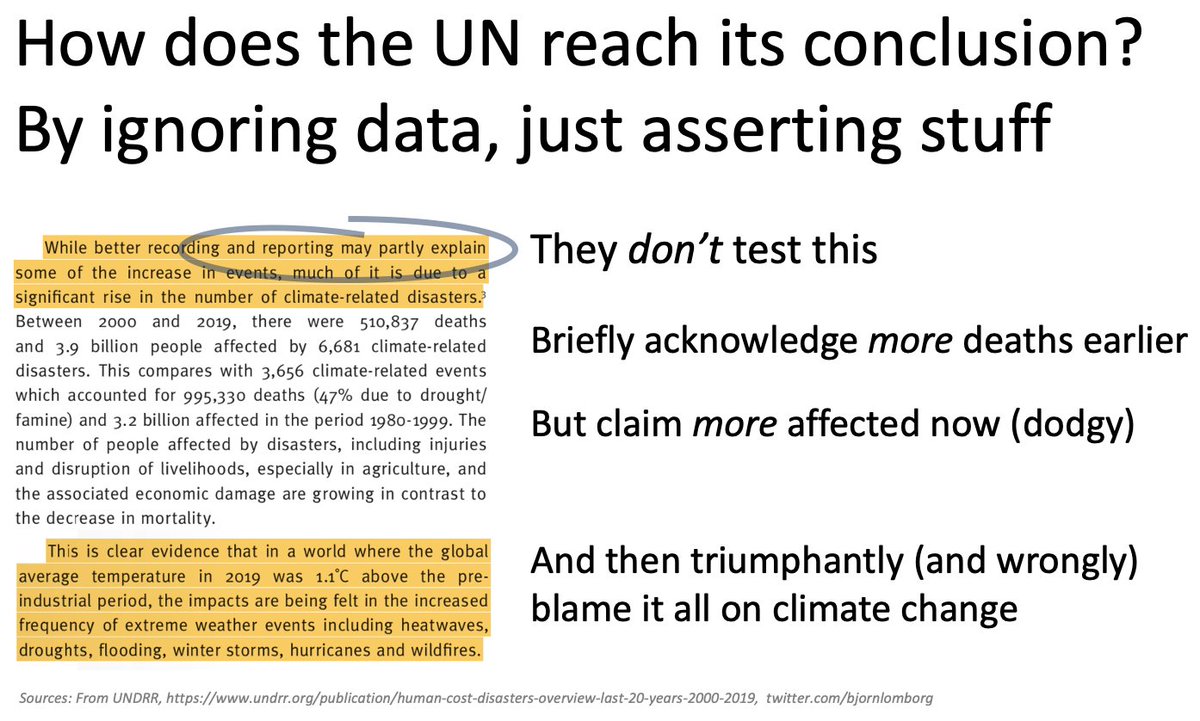
Not only has *actual* death data halved
Because population increased by 73% over 1980-2019, death risk has dropped by almost two-thirds
Report here: undrr.org/news/drrday-re…
Because population increased by 73% over 1980-2019, death risk has dropped by almost two-thirds
Report here: undrr.org/news/drrday-re…
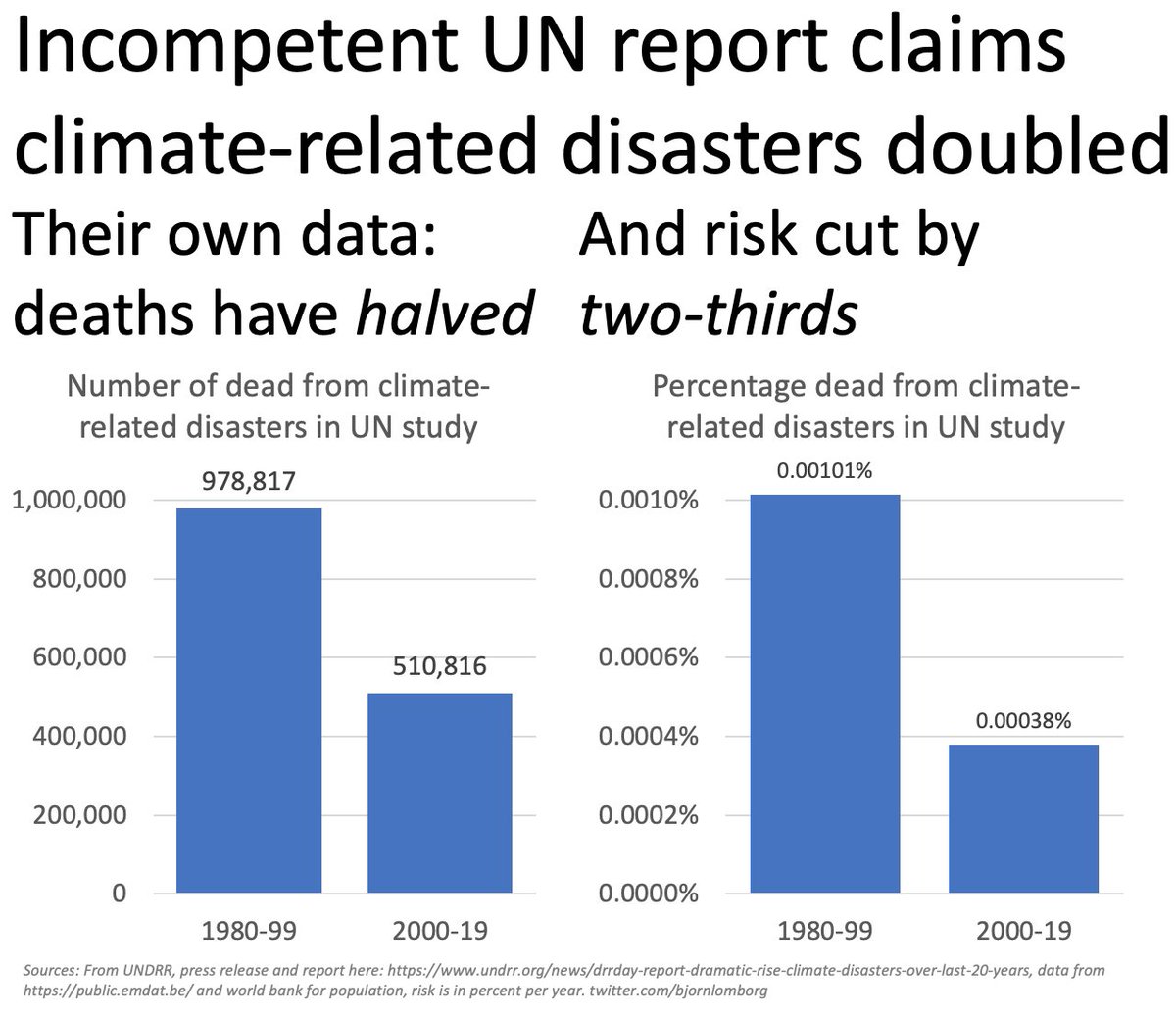
Known for a long time that actual death from climate-related disasters is not increasing
Death from climate-related disasters has declined 95%
Death risk from climate-related disasters has declined 99%
Leads to *very* different understanding of world
sciencedirect.com/science/articl…
Death from climate-related disasters has declined 95%
Death risk from climate-related disasters has declined 99%
Leads to *very* different understanding of world
sciencedirect.com/science/articl…
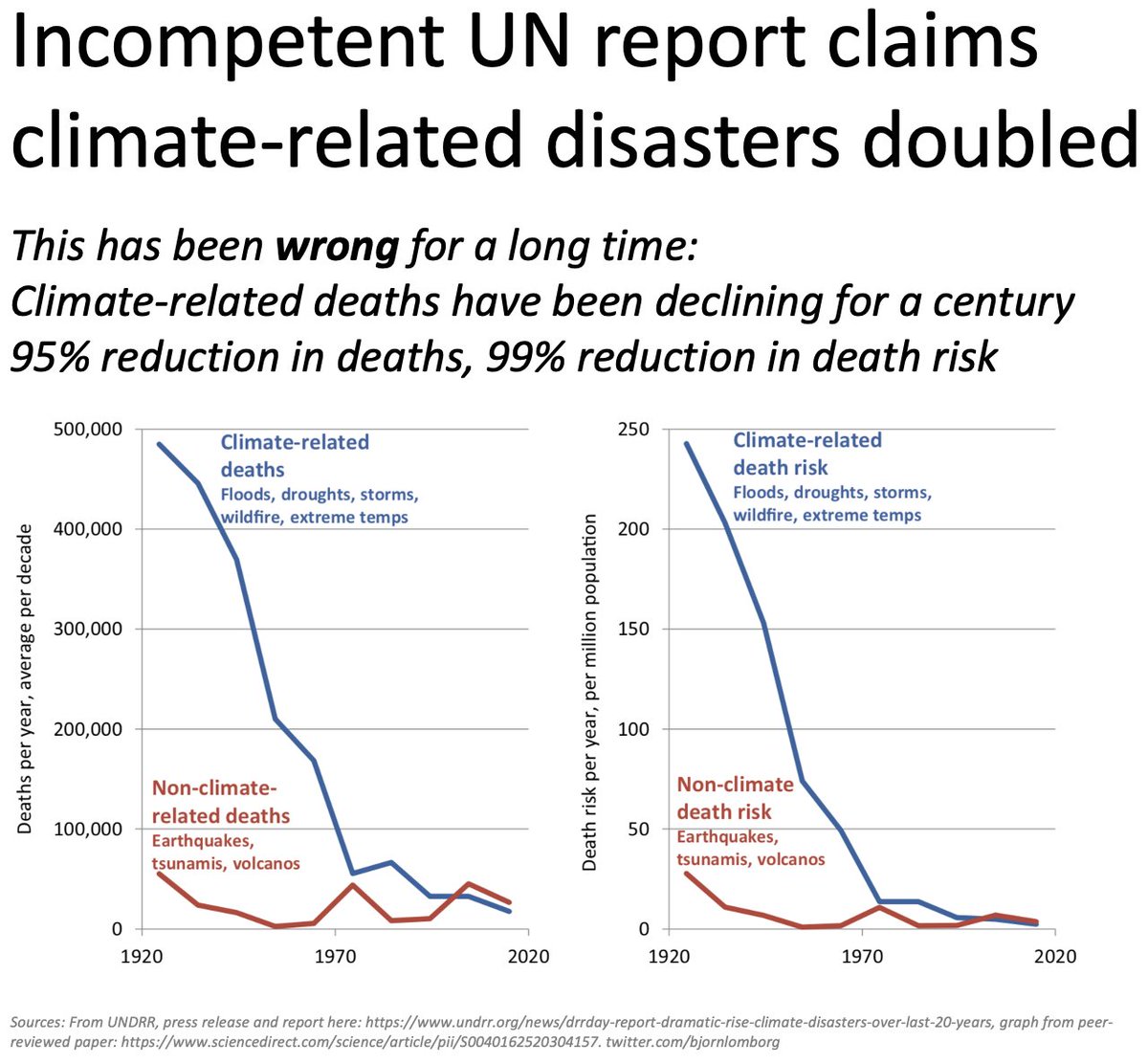
Because climate-related deaths are down, the report instead focuses on "number of affected"
It claims number of affected are up. But so is population
Proportion is actually *down*
Oops
Report here: undrr.org/news/drrday-re…
Data here: public.emdat.be
It claims number of affected are up. But so is population
Proportion is actually *down*
Oops
Report here: undrr.org/news/drrday-re…
Data here: public.emdat.be

UN claims number of climate-related incidents have increased
But this is mainly an issue of reporting: as we get closer to today, the database has many more reports of small disasters
Report here: undrr.org/news/drrday-re…
Data here: public.emdat.be
But this is mainly an issue of reporting: as we get closer to today, the database has many more reports of small disasters
Report here: undrr.org/news/drrday-re…
Data here: public.emdat.be
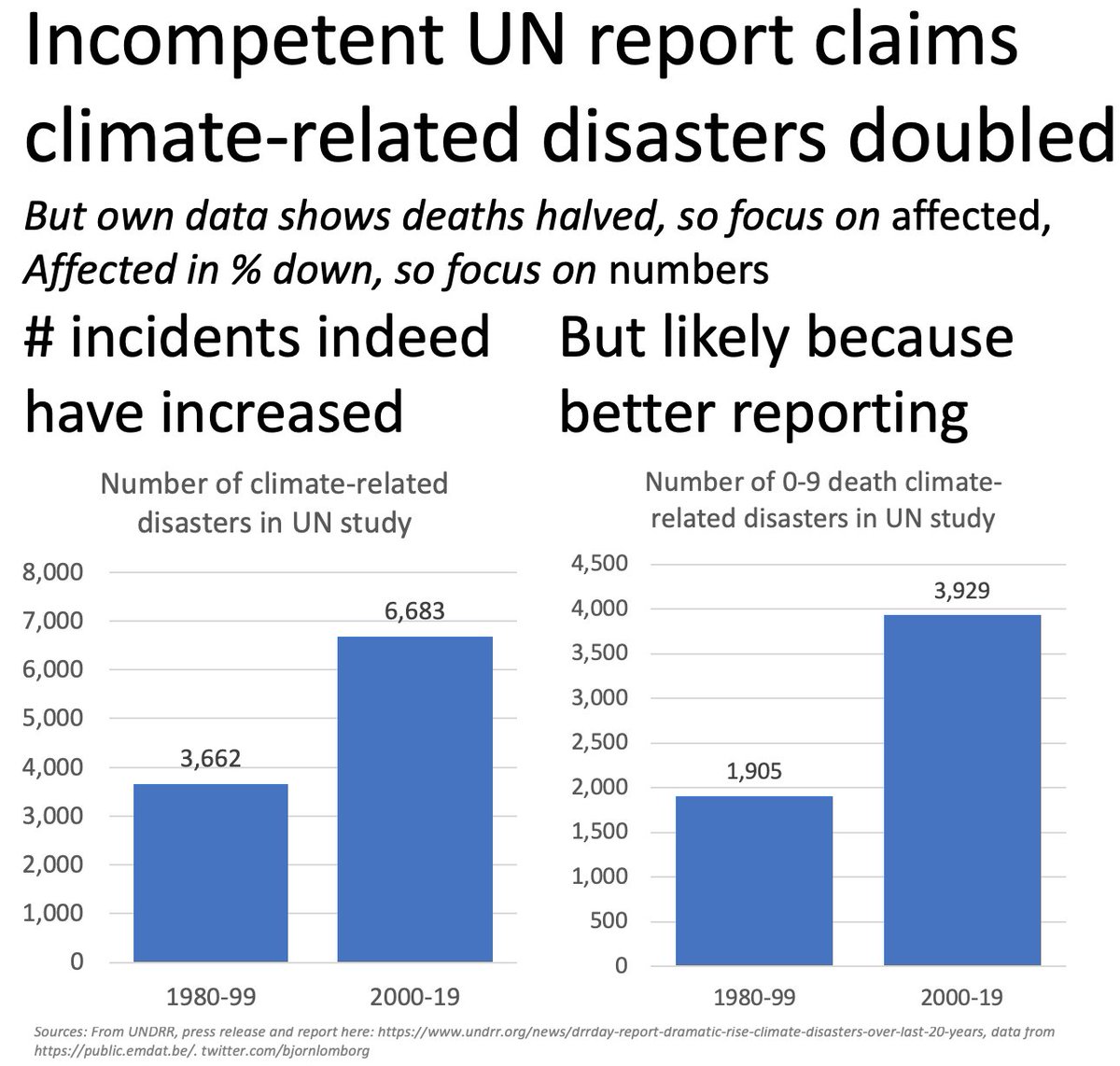
UN claims number of climate-related incidents have increased
But this is mainly an issue of reporting: as we get closer to today, the database has many more reports of small disasters
Small incidents have been increasing, large incidents have been decreasing
But this is mainly an issue of reporting: as we get closer to today, the database has many more reports of small disasters
Small incidents have been increasing, large incidents have been decreasing
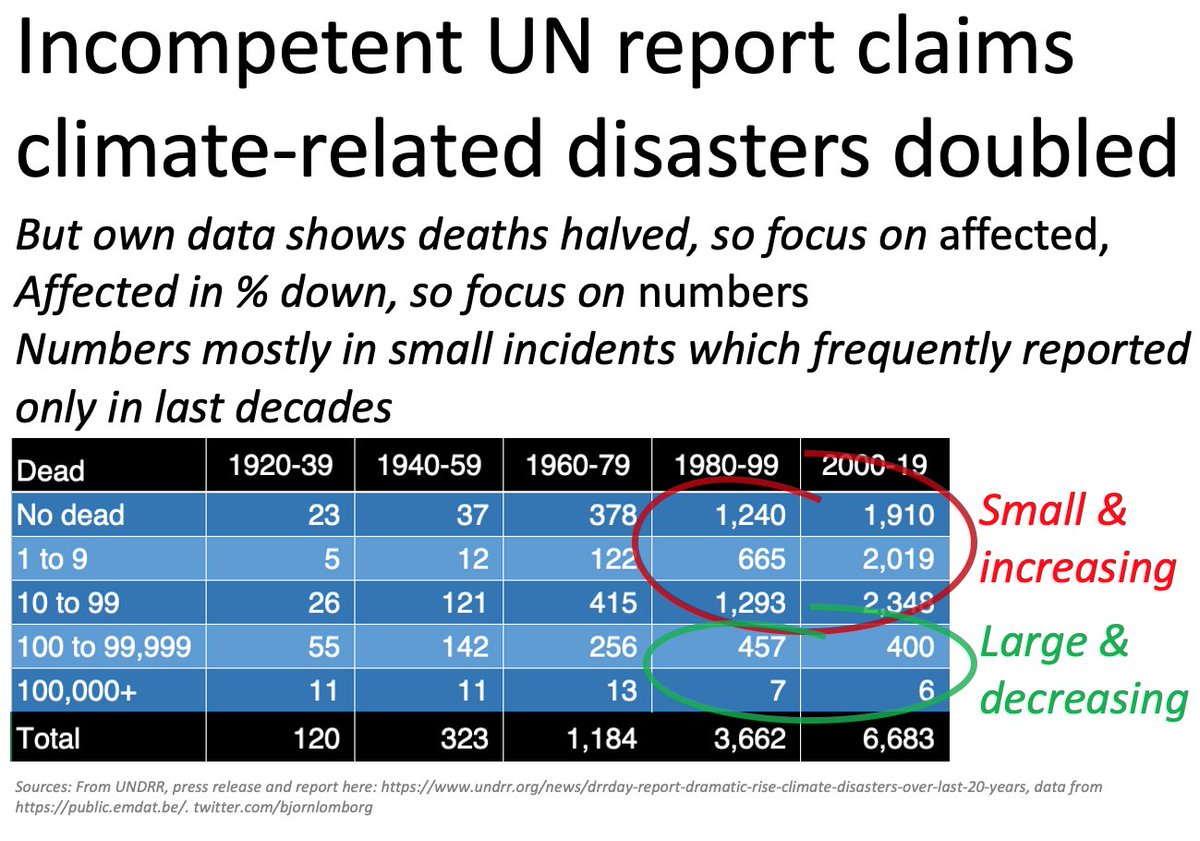
Easiest way to see the UN report is simply wrong is to compare their stats to actual well-documented data
We have great stats for US hurricanes, and reassuringly, UN and reality is reasonably in agreement (as expected, deaths better registered)
Data: link.springer.com/article/10.100…
We have great stats for US hurricanes, and reassuringly, UN and reality is reasonably in agreement (as expected, deaths better registered)
Data: link.springer.com/article/10.100…

Comparing the UN report with actual data shows that its *numbers* of catastrophes are wildly wrong
Whereas the actual number of US landfalling hurricanes have slightly decreased, the UN show ever-increasing numbers
journals.ametsoc.org/bams/article/9…
Whereas the actual number of US landfalling hurricanes have slightly decreased, the UN show ever-increasing numbers
journals.ametsoc.org/bams/article/9…

Another way to see the UN report is wrong is to look at US tornados. We have good stats, but here even deaths are off for UN
It seems UN caught few deaths in the early part, only converging in last 40 years
Data: spc.noaa.gov/wcm/#data
It seems UN caught few deaths in the early part, only converging in last 40 years
Data: spc.noaa.gov/wcm/#data

As US population doubled over period, here is death risk — same overall point, that UN only converge towards end-of-period
(Also, one stand-out is 1963, where EM-DAT has higher deaths, from Gainsville GA — probably miscoded, should be 1936)
Data: spc.noaa.gov/wcm/#data
(Also, one stand-out is 1963, where EM-DAT has higher deaths, from Gainsville GA — probably miscoded, should be 1936)
Data: spc.noaa.gov/wcm/#data

UN data is just terribly off on number US tornados
Reality is that strong US tornados (EF3+) have almost halved
Whereas UN data thinks it has increased 13-fold
Data: spc.noaa.gov/wcm/#data
Reality is that strong US tornados (EF3+) have almost halved
Whereas UN data thinks it has increased 13-fold
Data: spc.noaa.gov/wcm/#data
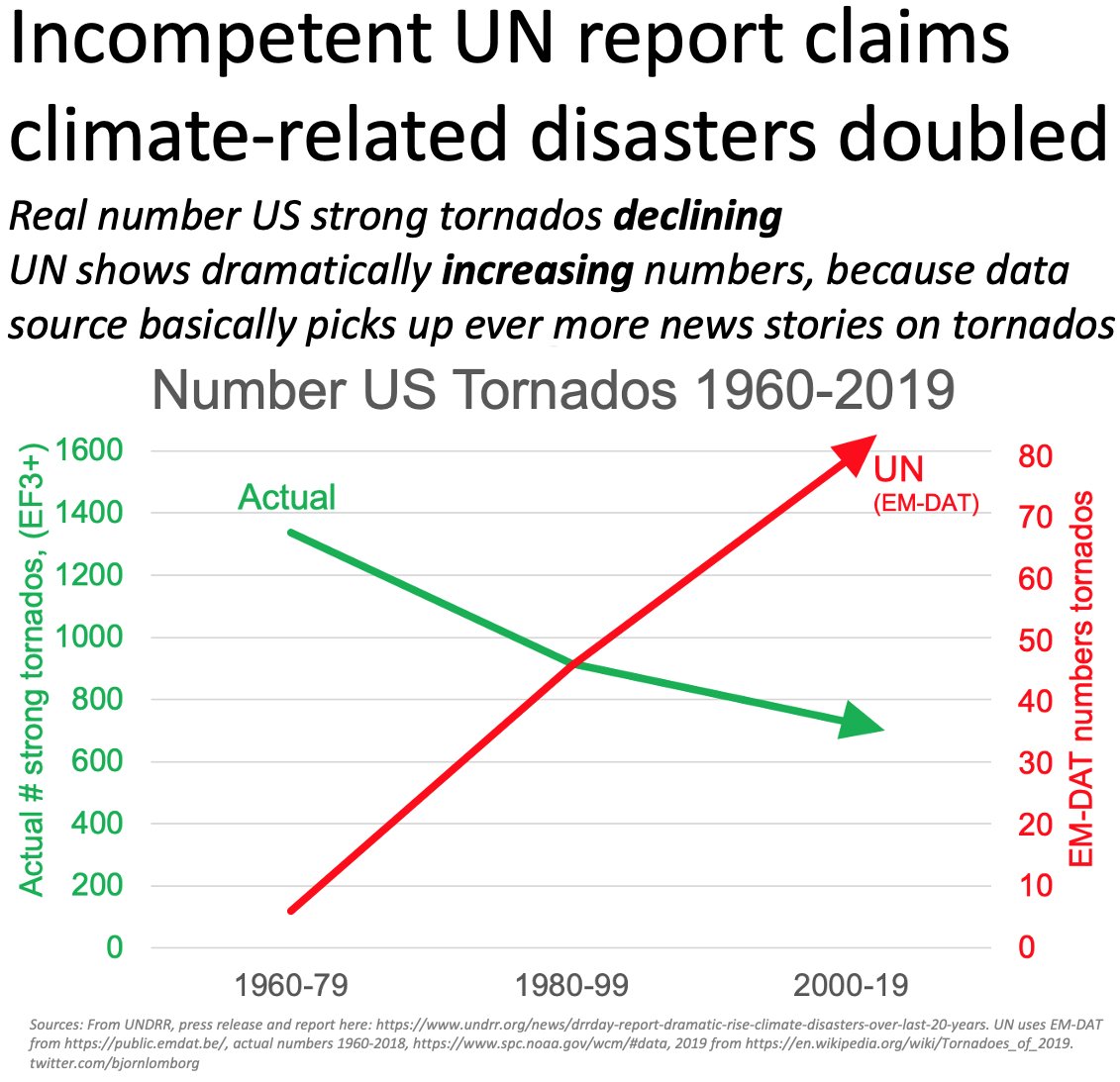
UN# incredibly off
Real tornado numbers 100x higher than UN numbers, but that includes mostly machine-noticed EF0 tornados
Yet, even strong tornados are 10x higher, EF4+ still 2-3x higher, and EF5s 41-12, all declining
UN shows that last 20 yrs 2.2x higher than reality
Real tornado numbers 100x higher than UN numbers, but that includes mostly machine-noticed EF0 tornados
Yet, even strong tornados are 10x higher, EF4+ still 2-3x higher, and EF5s 41-12, all declining
UN shows that last 20 yrs 2.2x higher than reality

The poor UN report is really just a re-run of previous climate alarmists claiming incredible disaster increases with EM-DAT, when the database shows "human impacts"
Their researcher says "you cannot claim trends in numbers"
Oops
web.archive.org/web/2018101917…
Their researcher says "you cannot claim trends in numbers"
Oops
https://twitter.com/NimaYaghmaei/status/1095379228307214339
web.archive.org/web/2018101917…
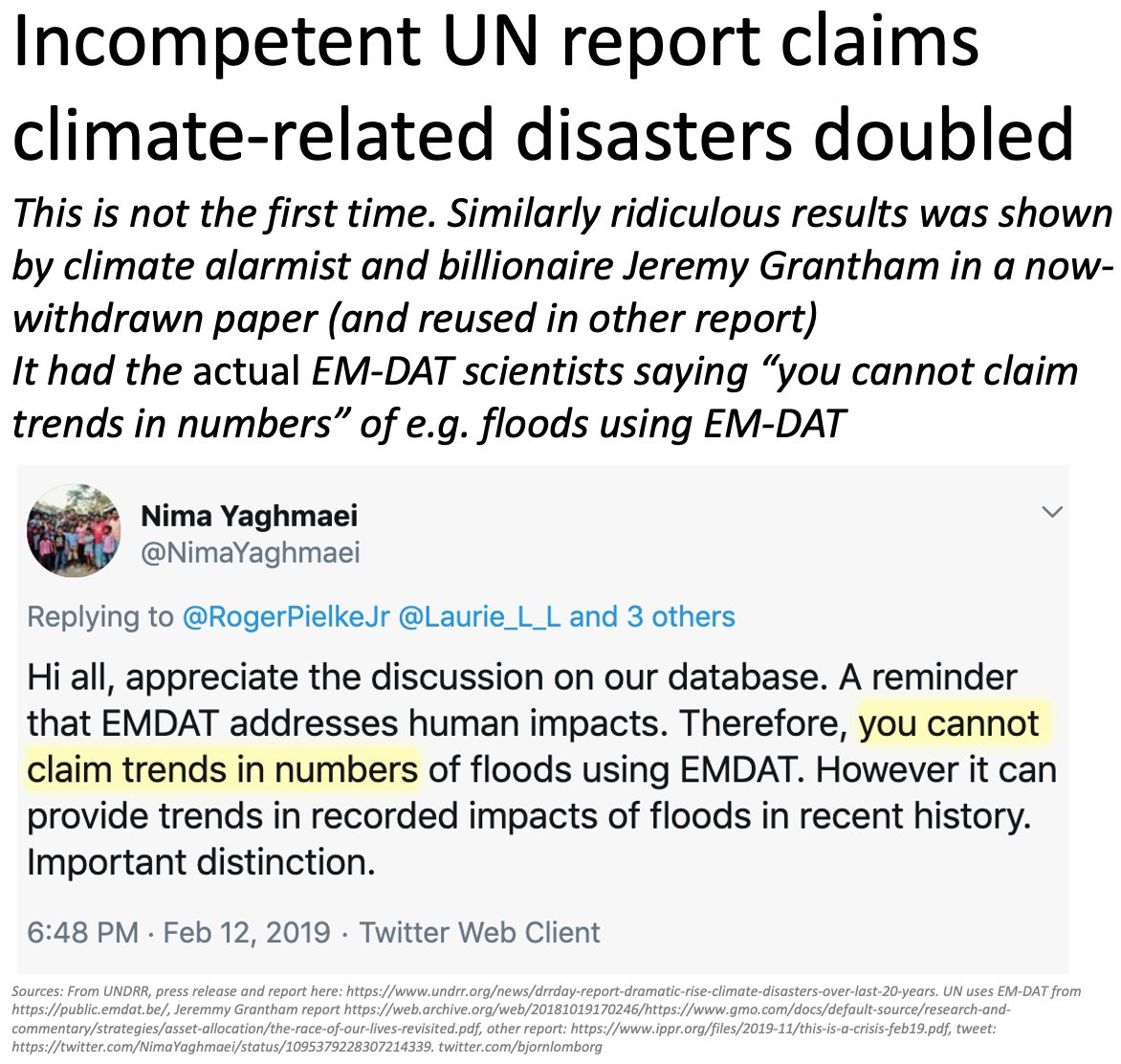
This was the UN headline figure. All data misleading/wrong
As we have seen for number of disasters in thread above
It also shows increase in deaths, but only true for earthquakes — dishonest on climate
Fails to adjust for population and economy
As we have seen for number of disasters in thread above
It also shows increase in deaths, but only true for earthquakes — dishonest on climate
Fails to adjust for population and economy

When you adjust damage costs for size of economy, which even the UN Sustainable Development Goals insists you should:
The relative cost of disasters is declining, not increasing
tandfonline.com/doi/full/10.10…
The relative cost of disasters is declining, not increasing
tandfonline.com/doi/full/10.10…
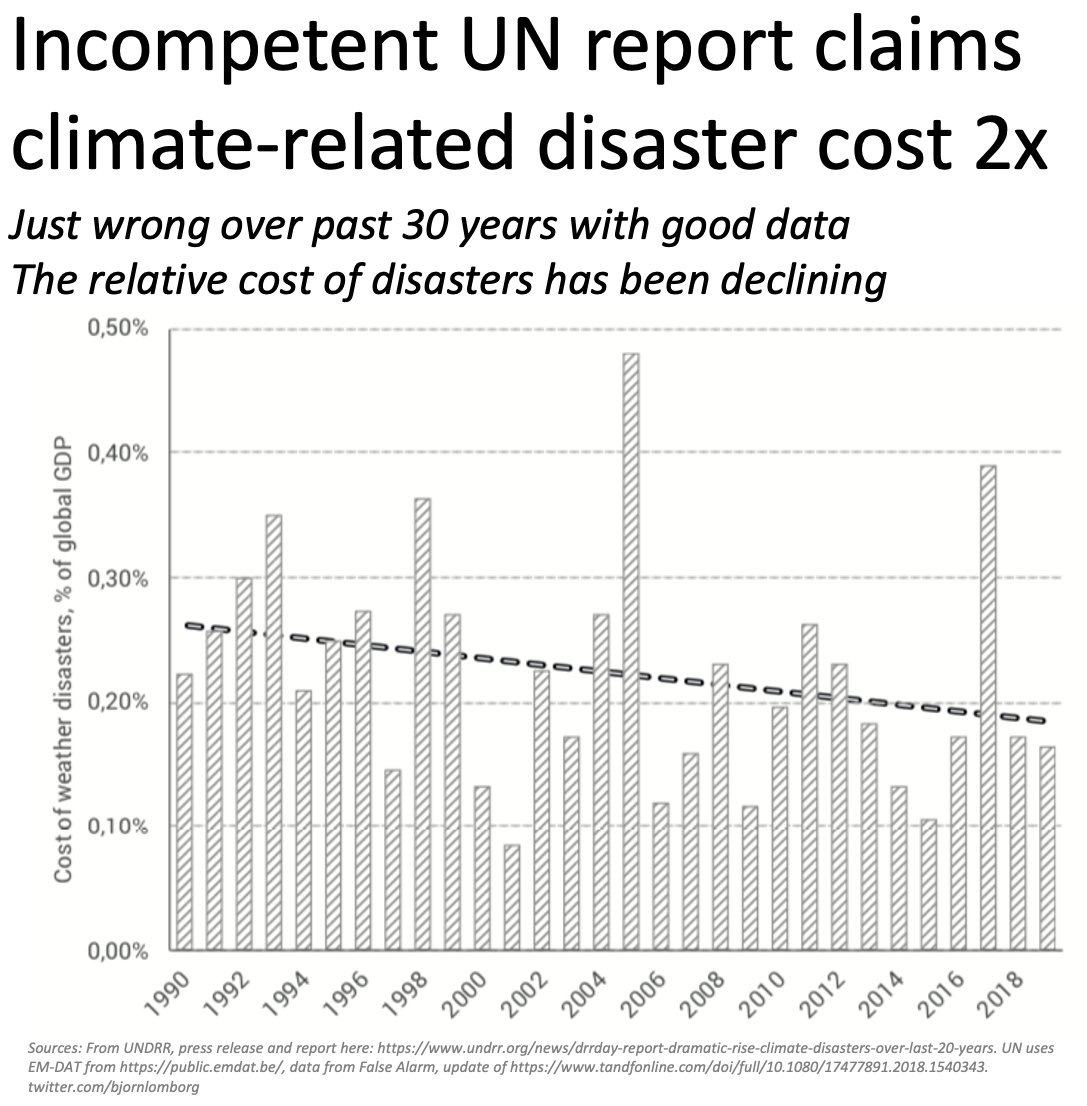
The UNs new report is incompetent and wrong on all major accounts
Not okay to scare people witless with bad analysis
The report should be withdrawn
ENDS
Not okay to scare people witless with bad analysis
The report should be withdrawn
ENDS
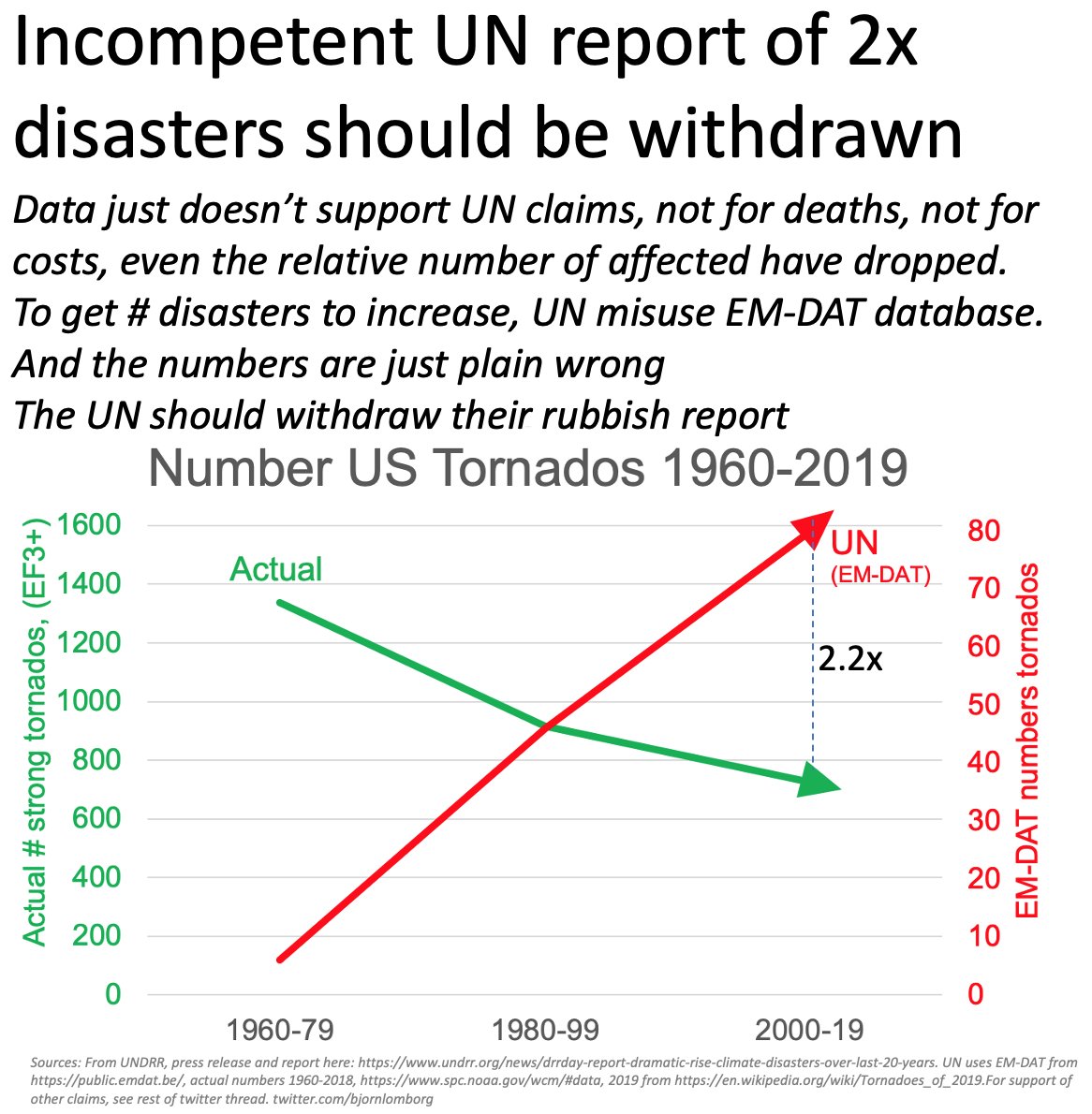
Here is another good overview of some of the EM-DAT problems notalotofpeopleknowthat.wordpress.com/2020/10/13/un-…
Link not working anymore, new link just as wrong... undrr.org/news/drrday-un…
• • •
Missing some Tweet in this thread? You can try to
force a refresh






